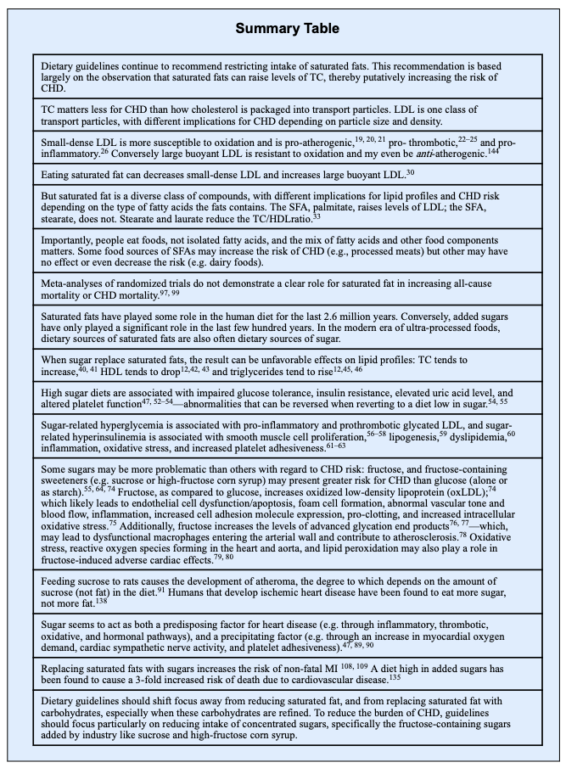This 2017 review summarizes the evidence linking saturated fat and sugar (respectively) to heart disease. Reviewers J. J. Nicolantonio, S. C. Lucan, and J. H. O’Keefe find more and stronger lines of evidence to implicate added sugar as the primary dietary factor driving increased cardiovascular disease risk.
As Nicolantonio et al. note, it is “well-accepted” that saturated fat raises blood total and LDL cholesterol (“bad” cholesterol) levels. Total cholesterol, however, shows only a moderate association with heart disease risk, and in some studies (such as in the Framingham Heart Study among men over 50 and women) no association at all.
Alternative lipid-based measures better predict heart disease. LDL is packaged in particles of varying size and density; a high concentration of small, dense LDL particles shows a stronger association with heart disease risk than total LDL cholesterol. Increased saturated fat intake lowers the number of small, dense LDL particles in the blood, and by this measure reduces heart disease risk.
The ratio of total cholesterol to HDL cholesterol (TC/HDL ratio) has also shown a stronger association with heart disease risk than any individual lipid marker (including total cholesterol, LDL cholesterol, and various particle-based measures such as apoB levels). Two common saturated fatty acids — stearate and laurate — primarily increase HDL and thus decrease the TC/HDL ratio, potentially decreasing heart disease risk.
Finally, replacing saturated fat with carbohydrate increases total cholesterol, decreases HDL, and increases triglyceride levels — all changes associated with increased cardiovascular risk. In sum, these data suggest saturated fat intake does not increase and may decrease heart disease risk.

Increased sugar consumption, conversely, has been linked to increased heart disease risk across multiple measures. A diet high in sugar increases total cholesterol, LDL cholesterol, and triglyceride levels while decreasing HDL cholesterol and increasing the TC/HDL ratio. Increased sugar consumption is also associated with insulin resistance, hyperglycemia, diabetes, fatty liver disease, and increased glycation and LDL oxidation, all of which further increase heart disease risk. Research has repeatedly shown these same defects can be reversed by removing sugar from the diet.
In sum, the authors find compelling evidence that added sugar, not saturated fat, is the primary dietary factor driving increased cardiovascular disease risk.
The evidence for saturated fat and for sugar related to coronary heart disease